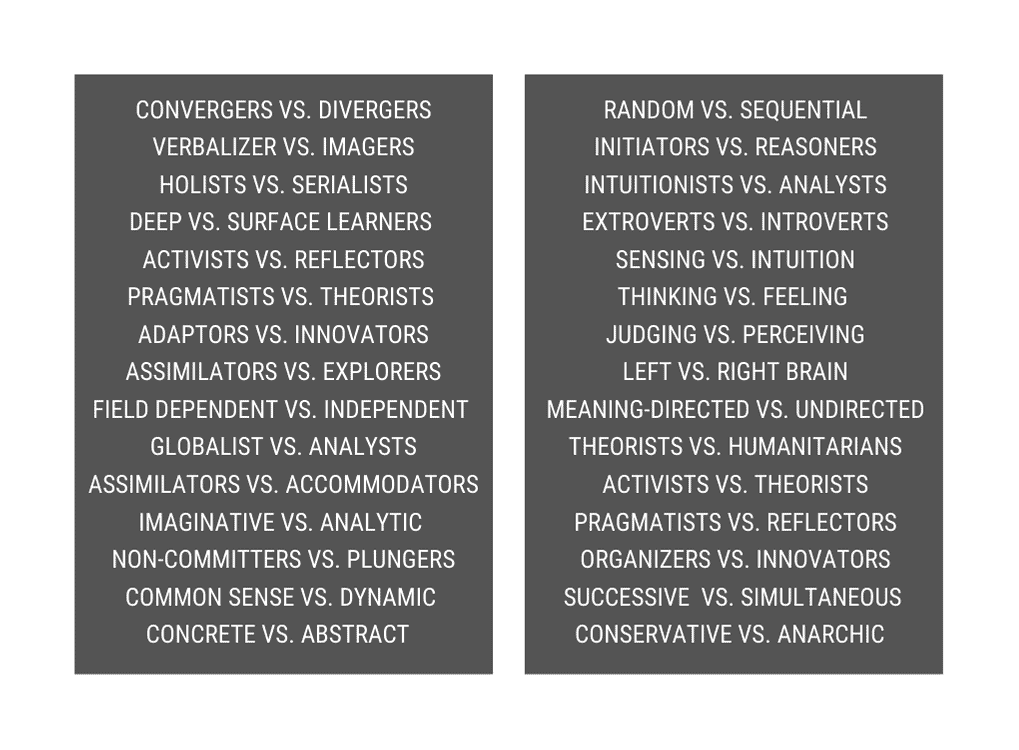The Appealing and Persistent Myth of Learning Styles
Cognitivism is an educational paradigm based on the premise that the brain processes information. To learn, one must direct their attention, comprehend incoming information, sort and organize data for storage in memory, connect new information to previously known information, recall information, and use the information to solve problems. Cognitivists believe that people can improve their mental processing ability with practice.
Many excellent teaching strategies and instructional design practices evolved based on cognitivist principles, but cognitivism also promoted several educational myths. Cognitivist myths include the idea of left-brain versus right-brain differences, the idea that we only use 10% of our brains, the idea that the brain is plastic only until children reach puberty, and the idea that learning is due to the addition of new brain cells.
The Biggest Cognitivist Myth of All Time
But the biggest cognitivist myth of all is the theory of learning styles that emerged in the 1970s from numerous cognitivist theorists. By the 1980s, instructors regularly administered learning style assessments and advised their students to study using visual, auditory, or kinesthetic methods – based on their assessment results – to improve their academic scores.
The idea that some students learn better when teachers present material visually, while others learn better when teachers offer the material verbally or through hands-on “doing” gained broad appeal. One study showed that 90% of teachers in K-12th grade education believed in learning styles. Learning styles created a thriving commercial market with around 71 different models. In addition to the visual, auditory, and kinesthetic model, these 30 models are popular:

Learning Styles are Out!
Today we know learning style assessments result in lower academic achievement. Yes. If you haven’t heard the news, learning styles are out! When students receive an evaluation suggesting that they learn a particular way, they opt out of learning experiences they view as different from their style. They limit themselves to specific learning patterns and won’t seek out learning opportunities that don’t match their ideas about how they learn.
Multiple Approaches are In!
Researchers tell us that the exact opposite of learning styles leads to higher academic outcomes. Students do best when they have opportunities to approach content from numerous directions. For example, if they read about a topic, discuss it, look at visual aids related to it, listen to someone explain it, play a game with it, apply it to a problem, and so forth, they deepen their knowledge and build their capacity as learners.
The digital textbooks we’re creating at Massage Mastery Online give learners multiple ways to approach content. Your students can learn independently by:
- Watching a video on concepts
- Looking at pictures and illustrations
- Reading the text
- Listening to the text
- Playing games to check their comprehension
- Testing themselves with lesson-specific quizzes
- Practicing terminology with flip cards
- Understanding the way that concepts work in the real world through the use of story and scenarios
Instructor-led learning experiences like discussion activities and role-playing provide even more opportunities for deepening student comprehension and memory recall.
As you approach your lessons this week, look for a new way to reinforce content. If you always lecture, great. Keep your lecture, but add a short discussion activity to provide a secondary approach to content. Continue to look for new ways to approach crucial content.
Is it time to make the switch?
Given how much more effective student learning is when information is taught in a multisensorial way, isn’t it time to make the switch to more effective learning tools.
This is your textbook now…

This is what it can be…

Massage Mastery Online textbooks are visually rich, with more images than you can fit into the confines of a printed book. They contain loads of video and audio. Students can have the text read to them or translate text into their native language at the touch of a button. Interactive elements throughout the books keep students engaged and they can take notes right within their digital book while doing their “reading”.
If you are a school owner or a director of education responsible for textbook adoptions, request review copies or our currently available books by clicking the button below and find out how powerful digital textbooks can be.
- Ambrose, S., Bridges, M., Lovett, M., DiPietro, M., and Norman, M. How Learning Works: 7 Research – Based Principles for Smart Teaching. Jossey-Bass, 2008.
- Coffield, F., Moseley, D., Hall, E., and Ecclestone, K. Learning Styles and Pedagogy in Post-16 Learning: A Systematic and Critical Review. London, UK: Learning and Skills Research Centre. 2004.
- Ertmer, P. A., Newby T. J. Behaviorism, Cognitivism, Constructivism: Comparing Critical Features from an Instructional Design Perspective. Performance Improvement Quarterly, 6(4):50–72. 1993.
- Furey, W. The Stubborn Myth of Learning Styles. Teachers and Teaching Volume 20, Number 3. Available at https://www.educationnext.org/stubborn-myth-learning-styles-state-teacher-license-prep-materials-debunked-theory/. Viewed December 2020.
- Khazan, O. The Myth of Learning Styles. The Atlantic. Science (2018). Available at https://www.theatlantic.com/science/archive/2018/04/the-myth-of-learning-styles/557687/. Viewed December 2020.
- Kirschner, P.A. Stop Propagating the Learning Styles Myth. Computers & Education. 106:166-171. 2017.
- Mayer, R.E. The Promise of Multimedia Learning: Using the Same Instructional Design Methods Across Different Media. Learning and Instruction, 13(2):125-139. 2003.
- Newton, P.M. The Learning Styles Myth is Thriving in Higher Education. Frontiers in Psychology, 6:1908, 2015.
- Newton, P.M., Miah, M. Evidence-Based Higher Education – Is the Learning Styles Myth Important? Frontiers in Psychology, 8:444, 2017.
- Pashler, H., McDaniel, M., Rohrer, D., and Bjork, Learning Styles: Concepts and Evidence. Psychological Science in the Public Interest, 9(3), 105-119, 2008.
- Schechter, R.L. Fact or Fiction? The Myth That We Have Specific Learning Styles, Debunked (2019). Available at https://www.hmhco.com/blog/fact-or-fiction-learning-styles-debunked. Viewed December 2020.
- Belief in Learning Styles Myth May Be Detrimental. American Psychological Association (2019). Available at https://www.apa.org/news/press/releases/2019/05/learning-styles-myth. Viewed December 2020.


